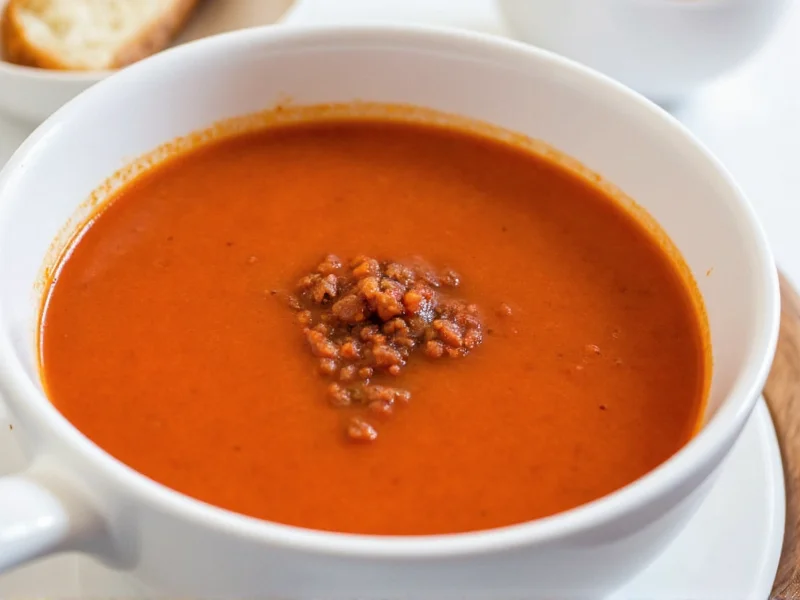Tomato soup remains a beloved comfort food worldwide, but many store-bought versions contain preservatives and lack authentic flavor. Creating restaurant-quality tomato soup at home requires understanding ingredient synergy and proper technique. This guide delivers a foolproof method that consistently produces rich, velvety soup with balanced acidity and depth.
The Science Behind Perfect Tomato Soup
Great tomato soup balances three critical elements: acidity, sweetness, and umami. Ripe tomatoes naturally contain citric and malic acids, which provide brightness but can become overwhelming. The secret lies in understanding how sugar neutralizes excess acidity without making the soup sweet, while umami-rich ingredients like tomato paste deepen the flavor profile.
Essential Ingredients Explained
Not all tomatoes work equally well for soup. Here's why specific ingredients matter:
| Ingredient | Function | Substitution Options |
|---|---|---|
| Roma tomatoes | Lower water content, richer flavor | Canned San Marzano tomatoes (BPA-free cans) |
| Tomato paste | Concentrated umami, thickens soup | None - essential for depth |
| Shallot or onion | Sweetness foundation | Leeks (for milder flavor) |
| Fresh basil | Herbal brightness | Oregano (½ tsp dried) |
Step-by-Step Preparation
Prep Work (10 minutes)
Chop 1 medium onion and 2 garlic cloves finely. Core and quarter 2 lbs Roma tomatoes. If using fresh tomatoes, score an 'X' on the bottom of each for easier peeling after blanching.
Cooking Process (25 minutes)
- Heat 1 tbsp olive oil in a heavy-bottomed pot over medium heat
- Sauté onions until translucent (5 minutes), add garlic for 1 minute
- Stir in 2 tbsp tomato paste and cook until brick-red (2 minutes)
- Add tomatoes, 2 cups vegetable broth, 1 tsp sugar, salt, and pepper
- Simmer uncovered for 20 minutes, stirring occasionally
- Remove from heat and cool slightly before blending
Professional Technique: The Blending Secret
For silky smooth texture without a food mill, use an immersion blender directly in the pot. If using a countertop blender, fill only halfway and hold the lid with a towel to prevent steam pressure from causing spills. Blend until completely smooth, about 1-2 minutes.
Flavor Enhancement Options
Elevate your easy homemade tomato soup recipe with these chef-recommended additions:
- Creamy version: Stir in ¼ cup heavy cream or coconut milk at the end
- Umami boost: Add 1 dried porcini mushroom while simmering
- Acidity balance: Finish with 1 tsp balsamic vinegar
- Texture contrast: Top with croutons or grilled cheese crumbles
Troubleshooting Common Issues
Even the best tomato soup recipe encounters problems. Here's how to fix them:
- Too acidic: Add small pinches of sugar while tasting, or a Parmesan rind while simmering
- Too thin: Simmer uncovered 5-10 minutes longer or add 1 tbsp tomato paste
- Flat flavor: Boost with ½ tsp smoked paprika or a dash of Worcestershire sauce
- Seedy texture: Pass through a fine-mesh sieve after blending
Storage and Reheating Guidelines
Properly stored classic tomato soup recipe leftovers maintain quality for up to 5 days. Cool completely before transferring to airtight containers. For best results when reheating:
- Stovetop: Warm over medium-low heat, stirring frequently
- Microwave: Heat in 60-second intervals, stirring between
- Freezing: Portion into ice cube trays, then transfer to freezer bags (keeps 3 months)
Variations for Dietary Needs
This healthy tomato basil soup recipe adapts beautifully to various dietary requirements:
- Vegan version: Use coconut milk instead of cream, ensure broth is vegan
- Low-sodium: Use no-salt-added tomatoes and homemade broth
- Gluten-free: Naturally gluten-free (verify broth ingredients)
- Keto adaptation: Increase healthy fats with olive oil, omit sugar
Why This Recipe Works Every Time
Unlike many quick tomato soup for beginners recipes that skip crucial steps, this method includes the professional technique of concentrating flavors through proper reduction and the strategic use of tomato paste. The 20-minute simmer allows raw tomato flavors to mellow while developing complex taste compounds. This attention to culinary science transforms simple ingredients into restaurant-style tomato soup at home.
Final Thoughts
Mastering this creamy tomato soup from scratch recipe opens doors to endless variations. The foundation of excellent soup lies in understanding how ingredients interact rather than following rigid measurements. As you gain confidence with this basic technique, experiment with roasted tomatoes for deeper flavor or add a pinch of red pepper flakes for subtle heat. Remember that the best tomato soup recipe is the one that consistently satisfies your taste preferences while using quality ingredients you trust.











 浙公网安备
33010002000092号
浙公网安备
33010002000092号 浙B2-20120091-4
浙B2-20120091-4